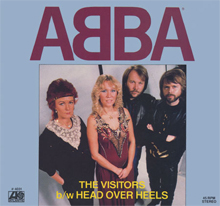|
The Visitors (song)
"The Visitors" (working title "Den första", meaning "The First"), also known as "The Visitors (Crackin' Up)",[3] is a 1981 song by the Swedish pop group ABBA. It is the title track from the band's studio album of the same name, and was released as the fourth and final single in April 1982. The lead vocal was performed by Anni-Frid Lyngstad. MeaningThe official stated theme is a protest against the persecution of political dissidents in the Soviet Union at the time, as ABBA seemed to put political issues into their lyrics in the final days of the group.[4] Björn Ulvaeus has stated that at the time of release he preferred that the song should have a sense of mystery so did not explain the exact meaning.[5] In 1982, the album The Visitors was banned in the Soviet Union,[6] possibly due to the band allowing a video of "When All Is Said and Done" to be shown in the United States Information Agency television special, Let Poland Be Poland, along with a spoken message from Ulvaeus and Benny Andersson,[7] broadcast via satellite around the world on 31 January 1982. The show, which also featured Frank Sinatra, Paul McCartney, Orson Welles, Henry Fonda, Margaret Thatcher, and Ronald Reagan, was a public protest against the then-recent imposition of martial law in Poland.[8] However, ABBA's segment was not included in the broadcast. The official reason given was time constraints. However, in a Rapport interview, Björn Ulvaeus mentioned that their message referenced human rights issues in several countries, including El Salvador and Chile.[9] This has led to speculation that political considerations might have influenced the decision to exclude the segment, although this remains unconfirmed. Reception"The Visitors" was released as the album's second (and final) single in the US instead of "Head over Heels," which remained as the B-side. The single peaked just outside the Top 60 at No. 63 on the singles chart in the U.S., and a double A-sided "The Visitors/When All Is Said and Done" 12" single reached No. 8 on the Billboard dance chart. The song was also remixed by Greg Silva subscription DJ remix service, Hot Tracks, into a much longer version that brought additional club play. This was the single most-requested remix by Hot Tracks, and was featured in Volume One of The Best of Hot Tracks.[10] AllMusic reviewer Bruce Eder retrospectively described the song as "a topical song about Soviet dissidents that also manages to be very catchy."[11] Personnel
Charts
References
External links |
|||||||||||||||||||||||||||||||||||||||||||||
Portal di Ensiklopedia Dunia
